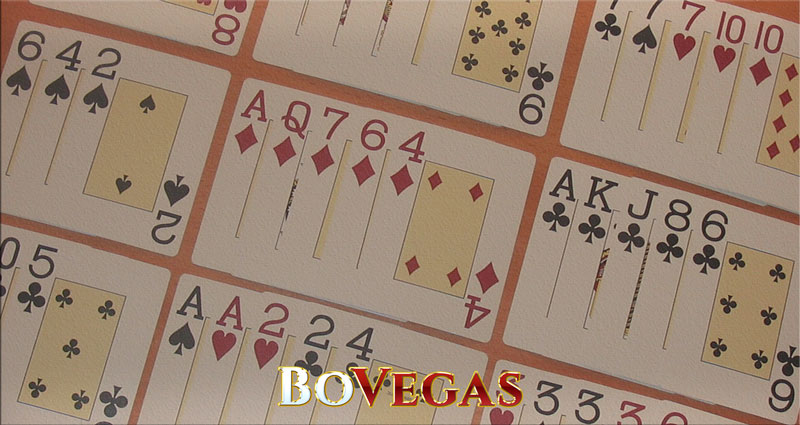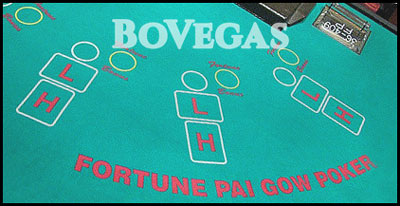



Known worldwide for its sophisticated cultural background, China is also synonymous with the fame of these popular gambling games: pai gow and Chinese poker. In the Central Kingdom, these two touchstones of poker have steadily expanded all over the gambling world. It’s important to note that it’s the United States where the game of pai gow poker started, branching out from the Chinese game pai gow. Nevertheless, China is indeed credited with the birth of this American poker variation and is considered by many the cradle of these two legendary games.
Aside from the essential poker element, the origin of the game is an element that makes them so alike yet so different. When pai gow poker emerged in the mid-80s, its original “pai gow” element was gradually squeezed out by traditional poker rules, and thus blotted out. This game soon lost its intrinsic resemblance to Chinese poker.
In 1985, creative Vegas casino mastermind Sam Torosian rethought the traditional model of casino gaming, generating the novel idea of merging two trending games – pai gow and the classic game of poker. This is how pai gow poker was born. The game was an instant breakthrough in the classic casino gaming range, for it was a unique blend of Eastern and Western gaming culture, combining the elements and features of the Chinese pai gow game and poker.

A headliner of the gaming culture in the Central Kingdom, Chinese poker has established itself as a remarkable and historic gambling game. It’s a card game centered around poker hand rankings that requires only rudimentary knowledge.
As in each poker variation, Chinese one involves an element of luck, allowing beginners to perform well in the game without any particular skills. The game is played with a standard 52-card deck. Each player is dealt a 13-card hand and has to divide these cards into three hands: two hands containing five cards and one that contains three cards.
Now we’re moving closer to the very core of our article, i.e. the main and stark differences between the games pai gow poker and Chinese poker. Some of the distinguishing features of these games, mentioned below, were already covered in the China Poker article and are now provided to show the substantial differences between the two games.
Betting
Chinese poker doesn’t require placing bets, while in pai gow poker betting is an integral part of the game.
Poker Hands
As was already mentioned, players only have to make two hands in pai gow poker at the end, a one-card hand and a two-card hand, and in Chinese poker, the number of hands is three – two five-card hands and one three-card hand.
Player Number
There are two to four players allowed in a game of Chinese poker and six players in pai gow poker.
Degree of Complexity
The game of Chinese poker comprises relatively simple combinations as well as the gaming mechanism, especially when compared to pai gow poker. The latter entails many more complex and elaborate rules that once again display the blended nature of this “hybrid” game.
Pai gow poker and Chinese poker have been conquering the gambling industry ever since their appearance showing the undeniable dominance of the western game. Despite the difference in rules and strategies, they are similar in their essence owing to the prominent place of their origin.

While playing table games in the casino, you might have seen some weird people circling around and sharing their tips and opinions on what you should have or shouldn’t have done. It seems like they know better when to raise the blind or fold and on what color to bet. From blackjack to craps – […]
Blackjack has always been one of the most popular table games in casinos around the world. But ever since the famous MIT Blackjack Team decided to play blackjack for real money and finally broke the news with their incredible success, people from all around the world started wanting a slice of the pie. Suddenly, the world has […]
Roulette is a traditional symbol of a system where all the outcomes are arrived at by pure chance. However, not all roulette wheels are created equal, and every outcome does depend on different factors. Moreover, a small change in the initial conditions can drastically affect the result. But can you beat the game of roulette […]
A blanket of myths neatly covers gambling, and we, as a respectable blog, have to pull it aside. Most casino myths sound a bit weird to anyone who doesn’t like games of chance, but for gamblers they aren’t so strange. It’s quite easy to believe that you can win a jackpot by picking the right […]
If you love gambling and have been to a land-based casino at least once, you may have thought about becoming a dealer. Playing the same game but from the opposite side, while communicating with other players, sounds like a dream job, right? A dealer is a straightforward job, and you will be the heart and […]
On Monday September 14, MGM announced that it plans to open its first smoke-free casino at the end of September, when Park MGM will finally reopen its venues to players and tourists. The resort comprises around 2,990 rooms and various restaurants, and it’s set to be reopened on September 30. The venue has been closed […]
Online gambling has undoubtedly taken a place of true supremacy over the casino industry during the pandemic. And the reason for that is quite clear: online casinos are more accessible, and you can always count on some encouragement from the casino administration to help you boost your game. However, this digital revolution has only been […]
The large selection of online gambling sites out there can make players somewhat puzzled, and give them a feeling of uncertainty about making the right choice of casino. Each online gambling venue offers its own conditions, games, and various bonuses, of course; but the most important thing is the reliability of the casino and the […]